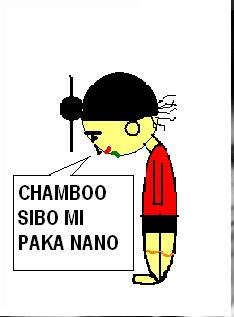Earthquake (MYOBU-HUNIING)
Scientifically speaking earthquakes are nothing but the tectonic movements of the earth crust which lead to a sudden (sometime violent) shaking of ground. Arunachal Pradesh as a whole and Ziro in particular are located in the earthquake prone zone of the country, we can see it from the figure given below (taken from Wikipedia).

In Apatani folklore we got different stories to hear about earthquakes. In olden days people generally used to believe that earthquakes occurred due to the shaking of Ear of CHAMBO SIIBO (Big Mithun) which is said to be lying beneath the earth crust. The movement of ear of CHAMBO SIIBO is very rare and occurs once in a while. This shaking of ear leads to the Myobu-Huniing (Earthquake). It is believed that whenever a prominent person in the society dies, the soul of person intends to visit CHAMBO SIIBO and hits its ear with a divine stick as a signal of his arrival at NELI (World where human souls live after death), and CHAMBO SIIBO shakes its ear and this leads to the earthquake.

All prominent persons in the society can not hit the CHAMBO SIIBO, for this purpose the man or woman should be born with a great thought and good morality, in another words one has to be blessed with good characters. As a child, I can still remember the shaking of earth occurring while some great person died from the society and used to believe the story of CHAMBO SIIBO narrated by folks at home. Now this story sounds unbelievable as we learn more about the reasons for occurrence of earthquakes. Fact is that our region is lying in the most earthquake prone zone of India which is due to tectonic movements of the faults between Indian plate and Eurasian plate. This naturally occurring phenomenon (i.e. MYOBU-HUNIING) is unavoidable, thus for the safety purpose we have to take great care while building our dwelling places, structures should built strong enough to resist the tremors due to earthquakes ranking high on Richter’s scale.
Sources:Ranth-Pigeh,Short Story by Er. Hage Pilliya.
beliefs about earthquakes





4 comments:
This story about Chambo Siibo is quite interesting. Although apparently specific to Taniis, it also fits well into a mythological frame found all over continental Asia and beyond. The great majority of myths related to earthquakes in this region share the common belief that the Earth rests on some sort of giant animal, and that seismic activities are directly caused by it. According to the Tibetan tradition the Earth is held up by a giant frog which carries it on its back. In China and Mongolia the gigantic animal which sustains the world is either a frog or a turtle. The Japanese and Manchus attributed earthquakes to a giant fish living underground, and for the ancient Hindus the earth was held up by four (or eight) elephants standing on the back of a turtle. In all cases earthquakes are believed to be caused by intentional or unintentional movements of the animal. In the East Himalayan region giant fishes, frogs and oxen are the animals most often related to earthquakes. What seems to be more specific to the Tanii belief is the association between the ox (here a mithun) and the afterworld.
I think in stead of "CHAMBO SIIBO" it should be "CHANKKO SIIBO". Chanko here means a piece of broken earthen pot or slate.
Millo Tago
Bangalore, Karnataka
@Tago sir,
Once again, thanks for your comment here....actually i have referred a book on folktales of Apatani i.e. “Ranth-Pigeh” by Er. Hage Pilliya. There, it is given as CHAMBO SIIBO (Big Mithun). Anyways, thanks for your correction. I will try to verify whether it was printing mistake on that book or either it is variation in language from Hari to Bulla.
I too heard it as Chanko Siibo only.
Post a Comment